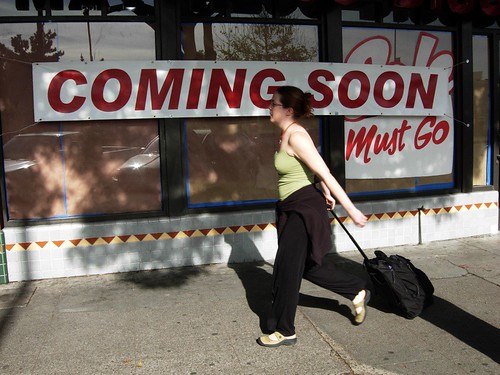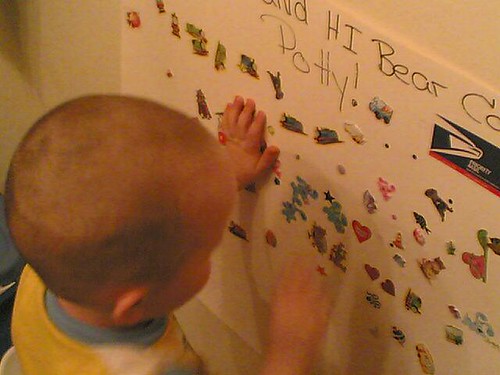One of the big frustrations disaster preparedness professionals constantly face is the difficulty of getting people to acknowledge the likelihood of an emergency event — whether its a natural disaster, pandemic flu or manmade terrorism — and to take actions to be ready if when it happens. The fact is, people don’t like to think about worst-case scenarios, and they definitely don’t like to have to spend effort and money to address something that they think is likely never to happen to them.
Public health and safety folks tend to come at the problem from a straightforward “Here are the facts. Are you prepared?” angle. Sometimes they also try to scare people into taking action. But you don’t often see disaster preparedness as a fun and social activity. Of course, the best idea I’ve seen for getting people engaged with the issue didn’t come from the professionals at all, but from a group of friends looking for fun. And talk about worst-case scenarios — it doesn’t get much worse than a full-out zombie invasion.
First of all, can you explain what Zombie Squad is?
Zombie Squad is the world’s premiere non-stationary cadaver
suppression task force. Of course, as you may know, our mission is not
only to keep your neighborhood safe from the shambling hordes but also
to help guide and educate others to better prepare themselves for any
disaster. We want the public to be ready for anything from a natural
or man made disaster, like a tornado or earthquake, to a full on
zombie apocalypse.
Our organization focuses on fulfilling its mission by sharing
information and promoting education about issues concerning survival
and preparation. We also encourage our large member base to be
involved in community organizations that promote disaster awareness or
assist in recovery efforts. Our members volunteer their time, attend
and organize fundraisers, and give to their communities in a number of
ways. By using the zombie survival theme, we are able to reach a
demographic that many organizations are unable to.
How did you get the idea to start Zombie Squad? Fighting off the
undead is not an obvious market niche.
The official story involves a group of friends returning home from a
movie one night and discussing how they would survive better than any
of the characters in the film. From there the idea grew into a group
of people who thought it would be fun to gain the skills necessary to
actually survive a scenario where society has fallen. As they told
their idea to other friends, word spread and the organization began to
take shape. Early members realized the practicality and usefulness of
many of the skills they were acquiring. The zombie survival theme
provides a fun context to learn basic survival skills, with none of
the usual stigma attached to being called a “survivalist.”
What kinds of people tend to join Zombie Squad?
We have active members from all walks of life ranging from graphic
designers and tattoo artists to military officers and lawyers. Cult
fans of the zombie/horror/post-apocalyptic genre seem to be
everywhere. It always amazes me how our members consistently donate
their time, effort, and money to support their communities.
What types of organizations hire your services or trainings?
Some of the organizations ZS has worked with include larger charities
like the Red Cross, Habitat for Humanity and Cancer Society but we try
to focus our efforts more towards the local communities where our
respective chapters reside. We do a lot of work putting on fund
raisers for local charities and collecting for local food and blood
banks.
How do you do your public outreach and education? What types of
activities do you use to raise awareness of disaster preparedness and
zombie survival?
Zombie Squad reaches the public via several paths. First and foremost
is our website which hosts general disaster preparation information
via our blog, well managed discussion forums and videos.
Over the last several years we’ve branched out with our traveling
“Zombie Survival” seminars that focus on general disaster preparation
with a zombie twist. These seminars draw quite a crowd who in many
cases come to see us for the zombie aspect but leave with knowledge
and interest in steps they can take to be more prepared for more
relevant disasters. We originally focused on sci-fi and horror
conventions around the country, but we’re also regularly invited to
bring our show to Boy Scout Troops, universities, disaster fairs and
even REI stores.
Last year our St. Louis Chapter put on its own disaster fair and it
was a huge success. The fair took place during the one year
anniversary of a series of storms that tore through St. Louis leaving
over 500,000 people without power, many for a week or more, on the
hottest days of the year. Another storm hit St. Louis again that
winter with similar devastation of local utilities. The goal of the
fair was to promote the importance of being prepared for similar
disasters and to bring local disaster agencies together to talk about
what they do for the community. We brought in guest speakers and
representatives who set up informational booths from a number of local
disaster response agencies such as the Red Cross, CERT, ARES, Human
Society, SCC Health Dept and others.
In addition to these educational programs our chapters host fund
raisers for various organizations, food drives, movie nights and other
events, as mentioned in the previous question.
Would you say the emphasis of your organization is more on having
fun with the zombie theme or on the disaster preparedness message?
Which part of it do you think gets people motivated to take action?
Both. Zombie Squad is occasionally described as an organization that
tricks people into learning. While many participants are drawn to our
events by their interest in the zombie and post apocalyptic
entertainment elements, they come to realize that everything we
present has real world applications.
At what point does the zombie fun end, and the serious
life-and-death discussions begin? Are there some issues at which you
draw the line at being humorous?
That’s a good question. We do have plenty of lines drawn to make sure
people don’t get the wrong impression. For instance, we clearly state
that the “zombies” we discuss are metaphors for natural and man made
disasters. They are not codewords for people of other races,
nationalities, religions, sexual orientation, or anything similar.
What are some of the advantages of addressing such a usually serious
and fear-driven topic from a new angle?
Taking the topic seriously but keeping it fun is a great way to keep
people interested. There are a number of informational campaigns that
have tried to scare the public into preparing for some big disaster,
but those fear tactics in marketing always appear unauthentic. The
average person sees through that facade. Our goal is to make sure
people respect the danger that disasters pose, but not live in fear of
them. Preparation is the key to beginning to control that fear.
What have been some of the barriers you’ve come up against in using
this unique approach to disaster preparedness, among your members, the people you are trying to reach, potential funders or others?
The obvious major barrier is the zombie survival theme itself. While
it is a great tool for reaching specific people, others tend to
automatically tune out the message. Usually this barrier is overcome
by calmly explaining that we do not actually think the dead will crawl
out of their graves any time soon (though we’re ready if they do). At
that point, people either get it, or they move on. The truth is,
there are a number of organizations out there that already cater to
those people.
Do you have any advice for other people working on health and social
causes who are trying to figure out how to make their messages
appealing and fun?
Bring in as many young people as you can. They have the best ideas
and the most motivation. The hard part is keeping their interest.
Stay on top of pop-culture trends and figure out a way to use it to
your advantage.
You can always try bribing them. One thing we find is that people
like to know that their time is appreciated when they volunteer.
There are great, inexpensive, and fun ways to reward volunteers for
their involvement that keep them happy and eager to support your
mission.
One project we’re working on now is our “Volunteer Awards Program.”
Not all of our members are able to get involved with local chapters,
so this program will allow them to still volunteer in their community
as part of Zombie Squad. Under the program, members will volunteer
for an organization with a cause they feel worthy of supporting and
keep track of their hours on a form we provide. We’re really flexible
about where they can volunteer. They just need to contact us for
approval if it’s not a charity on our list. Then at the end of the
year they tell us how many hours they volunteered and we send them a
number of incentive awards ranging from a new enamel ZS pin, patches,
stickers, shirts, and so forth, based on their level of participation.
It’s a way for us to thank our members for doing their part and it
helps us to get an idea what sort of charities our members are
interested in. We’re looking forward to how this program turns out and
our members seem really excited about participating.
Do you have any funny or unusual stories you can share that have
come out of the work you do? (Notwithstanding, of course, the fact
that the work itself is funny and unusual!)
The thing that always brings smiles to the faces of our members is the
realization of how far the organization’s message has spread. It’s a
common occurrence for Zombie Squad members nationwide to be out in
their communities wearing a ZS t-shirt and hear someone yell “Zombie
Squad” to them, or walk up and ask how they know about the
organization. When you think about the fact that this organization
started over a discussion held by a few people in a van in South St.
Louis, Missouri…it’s pretty amazing.
Is there anything else you would like to mention that I haven’t asked about?
Don’t you want to know about the robot threat?








 Nedra helps nonprofits and public agencies create positive change on health and social issues through social marketing and transmedia storytelling strategies at Weinreich Communications since founding the company in 1995. She helps organizations make a difference for the populations they serve by strategically designing programs that draw on state-of-the-art behavior change techniques, digital media approaches and the power of stories.
Nedra helps nonprofits and public agencies create positive change on health and social issues through social marketing and transmedia storytelling strategies at Weinreich Communications since founding the company in 1995. She helps organizations make a difference for the populations they serve by strategically designing programs that draw on state-of-the-art behavior change techniques, digital media approaches and the power of stories. 